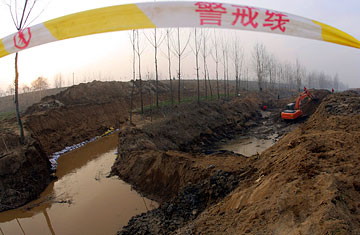
Workers try to contain diesel oil leaking from a pipeline into a river in China's Shaanxi province on Jan. 3, 2010
A pipeline accident just before New Year's Eve that dumped a massive amount of diesel fuel into two tributaries of China's Yellow River has exposed how far the country has to go before it can ensure the health of its imperiled waterways. An estimated 40,000 gal. (150,000 L) of diesel fuel spilled from a China National Petroleum Corp. pipeline in northwestern Shaanxi province, some two-thirds of which flowed into the Wei and Chishui rivers. Hundreds of workers have set up a series of temporary barriers in an effort to prevent the fuel from reaching the Yellow river, China's second longest waterway and a source of drinking water for millions.
"It's very tragic," says Wen Bo, China co-director for the NGO Pacific Environment. "It's more evidence that the oil companies are not prepared for such an ecological crisis." The accident mirrors a 2005 explosion that released 100 tons of toxic benzene into the Songhua river in northeastern China, tainting the water supply for several million residents of the city of Harbin. While that disaster helped sparked new public awareness of the extent of the nation's water pollution, the lessons of 2005 are still being painfully relearned today.
Then as now, news of the incident was only made public days after the initial accident. While the initial response to last week's spill was quick, coordination with downstream governments was slow, says Wen. "When the spill occurred, there were 700 people immediately mobilized to try to deal with the problem. That's still not enough," he says. "Officials should realize that once the spill occurred, they should immediately inform downstream areas."
The accident hit in the early morning of Dec. 30, when construction by third-party workers caused a rupture in a section of pipeline near the city of Weinan, according to a China National Petroleum statement. A government spokesperson for Weinan, a Shaanxi city along the Wei river, says that as of Jan. 4 no diesel from the leak had reached the Yellow river, about 62 miles (100 km) to the east. But some state media outlets said Monday that the fuel has already reached the Yellow river.
China has reported some modest progress in controlling water pollution, but environmental experts both inside and outside of the government say many of the country's rivers and lakes still suffer from severe contamination. In its latest annual assessment of the state of pollution in China the Ministry of Environmental Protection said in June that the country had released several plans for control of emissions into major rivers and inspected more than 15,000 drinking-water sources. But the agency acknowledged that "surface water pollution remained very serious" and nearly half of the water in the country's rivers was unsafe for human contact.
The Yellow river is considered "moderately polluted," according to the environmental ministry. A survey released in 2008 by the Yellow River Conservancy Committee, a Ministry of Water Resources-affiliated environmental organization, found that water in one-third of the river and its tributaries contained water unsuitable for industrial or agricultural use. More than 4 billion tons of sewage had been dumped into the river in 2006, according to a report by the state-run Xinhua news service.
While China's air pollution woes are literally more visible and
receive more attention, water pollution is generally believed to be
the country's more pressing environmental problem. The 3,395-mile (5,464 km) Yellow river, known as the mother river for its
role in sustaining early Chinese civilization, has an iconic role in China, and a threat to it will draw attention
the country's water woes in a way that few other Chinese rivers can. As hundreds of workers
race to prevent its already tainted waters from absorbing a new flood
of befouling chemicals, it serves as a painful reminder of how
imperiled by pollution this society has become.
—
With reporting by Jessie Jiang / Beijing
